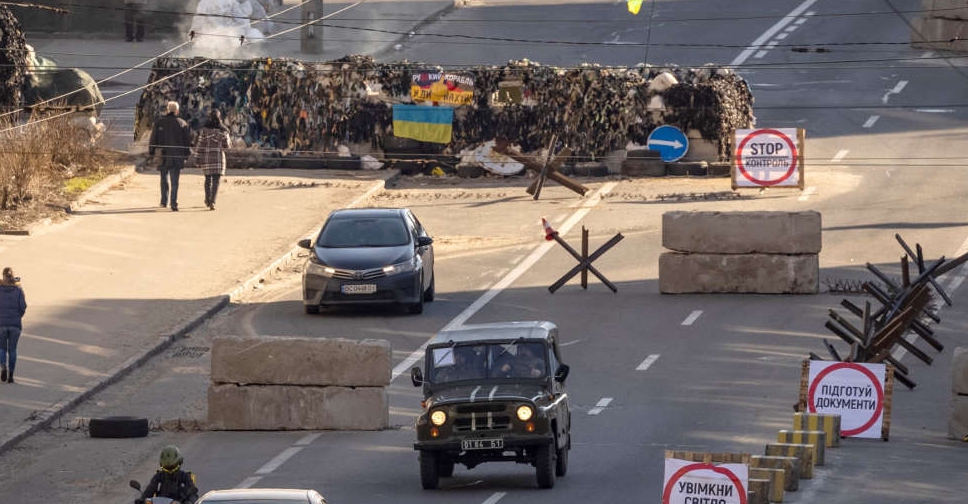
Russia and Ukraine both emphasised new-found scope for compromise on Wednesday as peace talks were set to resume three weeks into a Russian "special operation" in Ukraine.
Ukraine's President Volodymyr Zelenskiy said the talks were becoming "more realistic", while Russian Foreign Minister Sergei Lavrov said there was "some hope for compromise", with neutral status for Ukraine - a major Russian demand - now on the table.
Three weeks into the "operation", Russian troops have been halted at the gates of Kyiv, having taken heavy losses and failed to seize any of Ukraine's biggest cities in a war Western officials say Moscow thought it would win within days.
Talks were due to resume on Wednesday by video link for what would be a third straight day, the first time they have lasted more than a single day, which both sides have suggested means they have entered a more serious phase.
"The meetings continue, and, I am informed, the positions during the negotiations already sound more realistic. But time is still needed for the decisions to be in the interests of Ukraine," Zelenskiy said in a video address overnight.
On Tuesday, Zelenskiy had hinted at a possible route for compromise, suggesting Ukraine would be willing to accept international security guarantees that stopped short of its longstanding hope for full admission to the NATO alliance.
Keeping Ukraine out of NATO was long one of Russia's main demands in the months before it launched what it calls a "special operation" to disarm Ukraine.
"The negotiations are not easy for obvious reasons," Lavrov told media outlet RBC news. "But nevertheless, there is some hope of reaching a compromise."
"Neutral status is now being seriously discussed along, of course, with security guarantees," Lavrov said. "Now this very thing is being discussed in negotiations - there are absolutely specific formulations which in my view are close to agreement."
The head of Ukraine's negotiating team, Zelenskiy's aide Mykhailo Podlolyak, tweeted ahead of Wednesday's resumption of talks that Ukrainian military counteroffensives had "radically changed the parties' dispositions".
In an intelligence assessment released on Wednesday, Britain said Russian forces were trapped on roads, struggling to cope with Ukrainian terrain and suffering from a failure to gain control of the air.
"The tactics of the Ukrainian Armed Forces have adeptly exploited Russia's lack of manoeuvre, frustrating the Russian advance and inflicting heavy losses on the invading forces," said the report.
THREE MILLION REFUGEES
Europe's biggest invasion since World War II has reduced some Ukrainian cities to rubble and sent more than 3 million refugees fleeing abroad.
Ukraine said on Wednesday about 20,000 people had managed to escape the besieged port of Mariupol in private cars, but hundreds of thousands remain trapped by Russian shelling, many without heating, power or running water.
Deputy Prime Minister Iryna Vereshchuk said it was not clear whether the humanitarian corridor to the city would be opened on Wednesday. In a video address, she said Russian forces were in control of a hospital they had captured on Tuesday in Mariupol, and 400 staff and patients there were being held hostage.
The prime ministers of Poland, the Czech Republic and Slovenia were due home on Wednesday after an overnight journey out of Kyiv by train.
They met Zelenskiy in the Ukrainian capital on Tuesday in the first visit of its kind since the war began.
Zelenskiy was due to address the US Congress later on Wednesday by video link, having made similar appearances in parliaments across Europe. The White House said US President Joe Biden would make his first visit to Europe since the invasion next week to discuss the crisis with NATO allies.
The conflict has brought economic isolation upon Russia and the economic cost was fully exposed on Wednesday, as its sanctions-ravaged government teetered on the brink of its first international debt default since the Bolshevik revolution.
Moscow was due to pay $117 million in interest on two dollar-denominated sovereign bonds it had sold back in 2013, but it faces limits on making payments and has talked of paying in roubles, which would trigger a default.

 Iranian President Raisi killed in helicopter accident, state media says
Iranian President Raisi killed in helicopter accident, state media says
 ICC prosecutor seeks arrest warrants for Israeli, Hamas leaders
ICC prosecutor seeks arrest warrants for Israeli, Hamas leaders
 Assange given permission to appeal against US extradition
Assange given permission to appeal against US extradition
 Israel intends to broaden Rafah sweep, Defence Minister tells US
Israel intends to broaden Rafah sweep, Defence Minister tells US
 New Taiwanese president calls on China to stop threats
New Taiwanese president calls on China to stop threats



